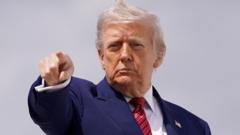Ongoing trade talks between the U.S. and E.U. face hurdles, despite attempts to make progress on tariff reductions.
U.S.-E.U. Trade Negotiations: Progress Amidst Challenges

U.S.-E.U. Trade Negotiations: Progress Amidst Challenges
Negotiations resume as U.S. delays tariffs for further discussions.
U.S. Commerce Secretary Howard Lutnick and E.U. Trade Commissioner Maros Sefcovic recently engaged in discussions about trade negotiations, following President Trump's decision to postpone 50 percent tariffs on E.U. imports. The aim is to allow for more time to navigate these complex negotiations.
On Sunday, President Trump had a phone conversation with Ursula von der Leyen, the President of the European Commission. This discussion was described by a spokesperson for the Commission, Paula Pinho, as providing "new impetus for the negotiations." Both parties hope to find resolutions by July 9, the date set for the implementation of the new tariffs.
Despite these diplomatic initiatives, significant differences remain between U.S. and E.U. priorities. The E.U. has expressed a willingness to eliminate tariffs on industrial goods, while also revamping lists of potential retaliatory tariffs against American products. On the flip side, the Trump administration is pushing for changes to European consumption tax systems and digital regulations—demands that European leaders remain resistant to modify.
As the negotiations progress, stakeholders are closely observing both the offers and demands from both sides, as clarity on these fronts is necessary to ensure a successful outcome in the trade relationship between the two economic powers.






















